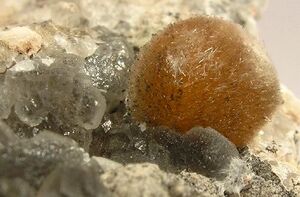Chemistry:Ferrierite
| Ferrierite | |
|---|---|
 Ferrierite-Mg, Kamloops Lake, British Columbia, Canada | |
| General | |
| Category | Zeolite |
| Formula (repeating unit) | ("A"position) 3-5Mg[Al 5-7Si 27.5-31O 72] · 18H2O |
| Strunz classification | 9.GD.50 |
| Crystal system | Orthorhombic |
| Crystal class | Dipyramidal (mmm) H-M symbol: (2/m 2/m 2/m) |
| Space group | Immm P21/n (Ferrierite-Na) |
| Identification | |
| Color | white, colorless, pinkish, orange to red |
| Mohs scale hardness | 3 – 3 1⁄2 |
| Streak | white |
| References | [1][2] |
The ferrierite group of zeolite minerals (the FER structure) consists of three very similar species: ferrierite-Mg, ferrierite-Na, and ferrierite-K, based on the dominant cation in the A location. ferrierite-Mg and ferrierite-K are orthorhombic minerals and ferrierite-Na is monoclinic with highly variable cationic composition (Na,K)
2Mg(Si,Al)
18O
36(OH) · 9H2O. Calcium and other ions are often also present. They are found in vitreous to pearly, often radiating, spherical aggregates of thin blade-shaped transparent to translucent crystals.
Ferrierite typically occurs as an alteration mineral in basaltic rocks and in tuffaceous sediments. In North America, it is found at Kamloops Lake, BC, Canada (the original type locality) and Leavitt Lake, California. Ferrierite was named for Canadian geologist and mining engineer Walter Frederick Ferrier (1865–1950).
Synthetic ferrierite
Synthetic ferrierites have even greater cation variability and have important uses as commercial filters and ion-exchange beds.
Ferrierite-H can be used as a catalyst in the chemical industry for the acid-catalyzed skeletal isomerization of n-butenes to isobutene, the raw material for production of methyl tert-butyl ether (MTBE).[4]
The hydrophobic all-silica ferrierite (Si-FER) has very high selectivity in the separation of alcohol–water mixtures, due to the very restrictive shape and space constraints of the FER framework type. At high pressure, Si-FER can achieve the separation of an ethanol–water liquid mixture into supramolecular blocks of its components, namely, ethanol dimer wires and water tetramer squares.[5]
See also
References
- ↑ Webmineral
- ↑ Mindat – Ferrierite-Mg
- ↑ Warr, L.N. (2021). "IMA–CNMNC approved mineral symbols". Mineralogical Magazine 85 (3): 291–320. doi:10.1180/mgm.2021.43. Bibcode: 2021MinM...85..291W.
- ↑ Wiedemann, Sophie C. C.; Ristanović, Zoran; Whiting, Gareth T.; Reddy Marthala, V. R.; Kärger, Jörg; Weitkamp, Jens; Wels, Bas; Bruijnincx, Pieter C. A. et al. (2016). "Large Ferrierite Crystals as Models for Catalyst Deactivation during Skeletal Isomerisation of Oleic Acid: Evidence for Pore Mouth Catalysis". Chemistry – A European Journal 22 (1): 199–210. doi:10.1002/chem.201503551. PMID 26611940.
- ↑ Arletti, Rossella; Fois, Ettore; Gigli, Lara; Vezzalini, Giovanna; Quartieri, Simona; Tabacchi, Gloria (2017). "Irreversible Conversion of a Water–Ethanol Solution into an Organized Two-Dimensional Network of Alternating Supramolecular Units in a Hydrophobic Zeolite under Pressure". Angewandte Chemie International Edition 56 (8): 2105–2109. doi:10.1002/anie.201610949. PMID 28067444.
External links
 |

